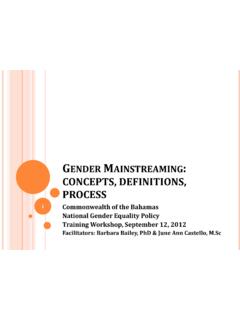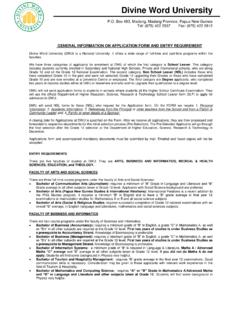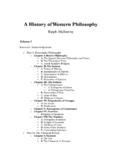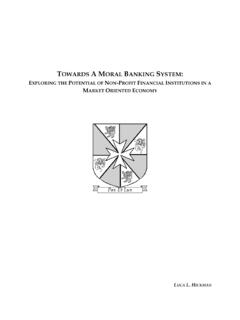Transcription of Andrews University Extension Center School of …
1 Andrews University Extension CenterSchool of EducationNorthern Caribbean UniversityCourse WorkPhilosophy of EducationA BookletPresented in Partial Fulfillmentof the Requirements for the CourseEDFN500 Foundations of Christian EducationbyAnnick M. BrennenAugust 1999 Philosophy of EducationBy Annick M. Brennen, MATABLE OF CONTENTSEach line in the table of contents is a hyperlinkEDUCATION6 What is Education?6 Ellen G. White s Purpose and Meaning of Christian Education7 The Purpose of Education7 The Meaning of Education8 What is Educational Philosophy?9 Educational Philosophies of Distinguished Philosophers10 Leo XIII s Position on Proper Religious and Moral Instruction10 The Value of Futurism to Education11 The Application of Reconstructionism to Education11 Educational Value of Humanism11 Educational Value of Progressivism11 Educational Value of Perennialism12 The Educational Value of Behaviorism13 Educational Value of Essentialism13 Educational Value of Existentialism14A Critique of Plato s Philosophy of Education as Given in The Republic14 The Eden School15 The Schools of the Prophets16 Jesus the Master Teacher: His Method18 His Mission19 His Preparation for Ministry19 His Qualifications19 His Teaching Scope19 His Philosophical Base20 His Content20 His Methods21 The Aims of Seventh-Day Adventist Education23 Are Seventh-Day Adventists Unique in Their Idea That the Church Should Be Concerned with Both the Temporal and Spiritual Aspects of Man s Life?
2 23 Content-Centered Approach Versus Child-Centered Approach to Education25 The Child-Centered Educational Approach26 The Content-Centered Educational Approach27 Curriculum and Teaching Method of the (A) Idealist, (B) Realist, and (C) Pragmatist29 The Curriculum of the Idealist29 The Teaching Method of the Idealist30 The Curriculum of the Realist30 The Method of the Realist31 The Curriculum of the Pragmatist31 The Method of the Pragmatist32 PHILOSOPHY33 What is Philosophy?33 The Aims and Tasks of Philosophy34 Metaphysical Questions35 Are Most Philosophers Atheists?36 Relationship Between Science and Philosophy39 Definition of Terms40 Idealism: Ultimate Reality Is Non-Material and Mental41 The Correspondence Theory of Truth Versus The Coherence Theory of Truth41 The Criterion for Knowledge42 The Sources of Knowledge43 World Views44 Essence of World Views44 PHILOSOPHICAL VIEWS47 The Philosophical Positions of (A) Idealism, (B) Realism, (C) Pragmatism47 What Is Pragmatism?
3 48 The Seeking of Knowledge as a Transaction49 The Core of Idealism50 Dichotomous Reality of the Idealist50 New Realism Versus Critical Realism50 What Is Sense Realism? 51 Bishop Berkeley s Idea of Reality - My Position51 What Is Scholasticism54Am I an Idealist, a Realist, or a Pragmatist? 55 Every Rational Person is a Philosopher59 GOD63 Logical Arguments for the Existence of God63 The Cosmological Argument64 The Teleological Argument65 Who Is God?66 Why Do I Believe in a God I Cannot See - My Response to an Atheist68 CREATION73 The Nature of Human Beings73 The Personal Dimension74 The Spiritual Dimension75 The Mental Dimension76 The Social Dimension76 The Moral Dimension77 The Physical Dimension77 Scientific Principles that Lend Support to the Theory of Creation79 Comparison of the Approach of Adventist Scientists and Worldly Scientists794 Points of Agreement79 Points of Disagreement80 What Do the Fossil Records Indicate?80A Comparison Between What Evolution Predicted and What Creation Predicted in FossilRecord81 The Significance of Eintein s Theory82 Cloning82 EDUCATIONWhat is Education?
4 Education is the most important and most noble of human endeavors. All other activitieshave their foundation in education. Education is so important that it will continue even ineternity. It enables humans to achieve their fullest personal, spiritual, mental, social, andphysical potentials. The ability of being educated is what distinguishes humans fromanimals. Education transforms an individual and allows her to effect change in discover the varied facets of education, we shall review a few definitions of education. Education is a continuing voyage of discovery, an everlasting quest to achieve the fullestwisdom and stature that God meant for according to George Knight (1980) is a life long learning process that can takeplace in an infinite variety of circumstances and to Kleining (1985), education is The range of activities both formal andinformal whereby people are initiated into or realigned with the evolving traditions,structures, and social relations which are taken to constitute their education.
5 Education should equip an individual to become a rational, willing agent, who is able toparticipate in and change one s world with a realistic understanding of its (1975) wrote: Education consists in initiating others into activities, modes ofconduct and thoughts which have standards written into them by references to which it ispossible to act, think and feel with varying degrees of relevance and taste. Ellen G. White s Purpose and Meaning of Christian Education The word education comes from the Latin educare, to draw out. In a broad sense itmeans not only to elicit creative thought and knowledge from the student, but to drawhumankind out of the predicament it is in. And that predicament, according to bothJewish and Christian viewpoints, radically differs from the original perfection Godestablished at creation (Youngberg, 1994, p. 69).Based on this definition, E. G. White had a very comprehensive and correct conception ofeducation. She saw education and redemption as being one and the same.
6 Her conceptionof education was practical and had earthly value, yet it had eternal implications. The Purpose of EducationThe quotation that best summarizes her purpose of education states that:5To restore in man the image of his Maker, to bring him back to the perfection in which hewas created, to promote the development of body, mind, and soul, that the divine purposein his creation might be realized this was to be the work of redemption. This is the objectof education, the great object of life (White, 1903, pp. 15-16).The Meaning of EducationMrs. White contends that:True education means more than the pursual of a certain course of study. It means morethan a preparation for the life that now is. It has to do with the whole being, and with thewhole period of existence possible to man. It is the harmonious development of thephysical, the mental, and the spiritual powers. It prepares the student for the joy ofservice in this world and for the higher joy of wider service in the world to come (White,1903, p.)
7 13).She further states that: In the highest sense the work of education and the work ofredemption are one, for in education, as in redemption, other foundation can no man laythan that is laid, which is Jesus Christ (White, 1903, p. 30).She explains that:He who cooperates with the divine purpose in imparting to the youth a knowledge ofGod, and molding the character into harmony with His, does a high and noble work. Ashe awakens a desire to reach God s ideal, he presents an education that is as high asheaven and as broad as the universe; an education that cannot be completed in this life, butthat will be continued in the life to come; an education that secures to the successfulstudent his passport from the preparatory School of earth to the higher grade, the schoolabove (White, 1903, p. 19).Her most meaningful statement relates to the nature of the learner. She emphaticallyaffirms that:Every human being, created in the image of God, is endowed with a power akin to that ofthe Creator individuality, power to think and to do.
8 It is the work of true educationto develop this power, to train the youth to be thinkers, and not mere reflectors of othermen s thought. Instead of confining their study to that which men have said or written, letstudents be directed to the sources of truth, to the vast fields opened for research in natureand revelation. Let them contemplate the great facts of duty and destiny, and the mindwill expand and strengthen. Instead of educated weaklings, institutions of learning maysend forth men strong to think and to act, men who are masters and not slaves ofcircumstances, men who possess breath of mind, clearness of thought, and the courage oftheir convictions (White, 1903, pp. 17-18).What is Educational Philosophy?Educational philosophy is philosophy applied to education as a specific area of humanendeavor. It involves bringing those critical reflections which characterize philosophy ingeneral to influence and direct the range of experiences and possessions that may bereferred to as education.
9 Philosophy of education does not exist in a vacuum, but within aparticular social and historical context. Educational philosophy, according to Soltis (1988) has three dimensions: (1) the personal,(2) the public, and (3) the professional. The personal dimension has to do with having a6set of personal beliefs about what is good, right, and worthwhile in education. The publicdimension is aimed at guiding and directing the practice of many. The professionaldimension provides specific guidelines for the practice of Philosophies of Distinguished PhilosophersThe educational philosophy of Plato rests on the four moral principles of wisdom, virtue,service, and declared that character, the moral end of life, should be the central aim indicated that it was not clear to him whether education should be concernedmore with intellectual or with moral virtues. He concluded that education should be basedon three principles: (1) the golden mean, (2) the possible, and (3) the Locke in his book, Thoughts on Education, concluded that a sound mind in a soundbody is a short but full description of a happy state in this G.
10 White stresses the mental, physical, moral, and spiritual development of thestudent. She espouses a philosophy based on the Word of God, a philosophy thatrecognizes God as the Creator of all XIII s Position on Proper Religious and Moral InstructionPark cited in Thomas (1998) stated that Leo XIII has wisely pointed out, that withoutproper religious and moral instruction every form of intellectual culture will be injurious;for young people not accustomed to respecting God will be unable to bear the restraint ofvirtuous life, and never having learned to deny themselves anything, they will easily beincited to disturb the public order. In essence, Leo XIII is saying that religious and moralinstruction is indispensable to the formation of the whole Value of Futurism to EducationFuturism focuses on social and political reforms. Futurists are calling for educators togenerate successive alternate images of the future by: (1) creating an awareness of theinjustices, contradictions, and problems in our current world order and thinking of positiveways to deal with them; (2) using curricular subjects such as economics, psychology,sociology and political science to create Application of Reconstructionism to EducationReconstructionism application to education is twofold: (1) the identification of majorproblem areas of controversy, conflict and inconsistency in subject areas such aseconomics, sociology, political science, psychology, and anthropology.







